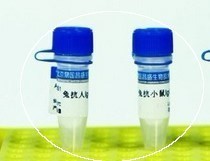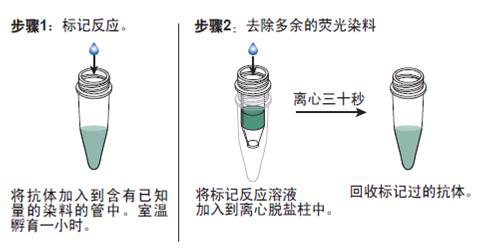
|

| 产地 | 进口、国产 |
| 品牌 | 上海莼试 |
| 保存条件 | Store at -20 °C |
| 货号 | CS9849 |
| 应用范围 | WB=1:100-500 ELISA=1:500-1000 IP=1:20-100 IHC-P=1:100-500 IHC-F=1:100-500 Flow-Cyt=1:100-500 IF=1:100-500 |
| CAS编号 | |
| 抗体名 | Anti-Nephrin |
| 克隆性 | |
| 靶点 | 详见说明书 |
| 适应物种 | 详见说明书 |
| 形态 | 详见说明书 |
| 宿主 | 详见说明书 |
| 亚型 | IgG |
| 标识物 | 详见说明书 |
| 浓度 | 1mg/1ml% |
| 免疫原 | KLH conjugated synthetic peptide derived from human Nephrin N-terminus |
产品订购信息:
英文名称 Anti-Nephrin
中文名称 肾小球细胞粘附分子受体抗体费用
别 名 CNF; NPHN; Nephrosis 1 congenital Finnish type; NPHS 1; NPHS1; Renal glomerulus specific cell adhesion receptor; Renal glomerulus-specific cell adhesion receptor; NPHN_HUMAN .


浓 度 1mg/1ml
规 格 0.1ml/100μg 0.2ml/200μg
抗体来源 Rabbit
克隆类型 polyclonal
交叉反应 Human, Mouse, Rat
产品类型 一抗
研究领域 信号转导 细胞骨架
蛋白分子量 predicted molecular weight: 138kDa
性 状 Lyophilized or Liquid
免 疫 原 KLH conjugated synthetic peptide derived from human Nephrin N-terminus
亚 型 IgG
纯化方法 affinity purified by Protein A
储 存 液 0.01M PBS, pH 7.4 with 10 mg/ml BSA and 0.1% Sodium azide
肾小球细胞粘附分子受体抗体费用 产品应用 WB=1:100-500 ELISA=1:500-1000 IP=1:20-100 IHC-P=1:100-500 IHC-F=1:100-500 Flow-Cyt=1:100-500 IF=1:100-500
(石蜡切片需做抗原修复)
not yet tested in other applications.
optimal dilutions/concentrations should be determined by the end user.
保存条件 Store at -20 °C for one year. Avoid repeated freeze/thaw cycles. The lyophilized antibody is stable at room temperature for at least one month and for greater than a year when kept at -20°C. When reconstituted in sterile pH 7.4 0.01M PBS or diluent of antibody the antibody is stable for at least two weeks at 2-4 °C.
Important Note This product as supplied is intended for research use only, not for use in human, therapeutic or diagnostic applications.
产品介绍 Primary steroid resistant nephrotic syndrome (SRNS) is characterized by childhood onset of proteinuria and progression to end stage renal disease. Kidney podocytes and their slit diaphragms form the final barrier to urinary protein loss. Congenital nephrotic syndrome (CNS) is caused by mutations in NPHS1 (nephrin) or NPHS2. Nephrin, a recently identified protein is a member of a group of podocyte proteins that constitute major component of the slit diaphragm especially in the foot process. Nephrin, a cell adhesion molecule, may play a crucial role in maintaining the glomerular filtration barrier. Recent studies have suggested that mutations in the gene for Nephrin reportedly lead to congenital nephrosis. Three novel podocyte proteins, Podocin, Nephrin and alpha Actinin 4 have been identified in congenital and experimental models of proteinuria. The role of Nephrin in anti apoptotic activity in podocyte slit diaphragm is believed to be associated with vascular endothelial derived growth factors VEGF signaling.
Function : Seems to play a role in the development or function of the kidney glomerular filtration barrier. Regulates glomerular vascular permeability. May anchor the podocyte slit diaphragm to the actin cytoskeleton. Plays a role in skeletal muscle formation through regulation of myoblast fusion.Subunit : Interacts with CD2AP (via C-terminal domain). Interacts with MAGI1 (via PDZ 2 and 3 domains) forming a tripartite complex with IGSF5/JAM4. Interacts with DDN; the interaction is direct. Self-associates (via the Ig-like domains). Also interacts (via the Ig-like domains) with KIRREL/NEPH1 and KIRREL2; the interaction with KIRREL is dependent on KIRREL glycosylation. Forms a complex with ACTN4, CASK, IQGAP1, MAGI2, SPTAN1 and SPTBN1 (By similarity). Interacts with NPHS2.Subcellular Location : Cell membrane; Single-pass type I membrane protein (Potential). Note=Predominantly located at podocyte slit diaphragm between podocyte foot processes. Also associated with podocyte apical plasma membrane.Tissue Specificity : Specifically expressed in podocytes of kidney glomeruli. Expressed in kidney glomeruli. In the embryo,expressed in the mesonephric kidney at E11 with strong expression in cranial tubules with podocyte-like structures. Expression is observed in the podocytes of the developing kidney from E13. High expression is also detected in the developing cerebellum, hindbrain, spinal cord, retina and hypothalamus. Expressed in skeletal muscle during myoblast fusion such as in the adult following acute injury and in the embryo but not detected in uninjured adult skeletal muscle. Isoform 1 and isoform 2 are expressed in the newborn brain and developing cerebellum. Isoform 1 is the predominant isoform in adult kidney.Post-translational modifications : Phosphorylated at Tyr-1193 by FYN, leading to the recruitment and activation of phospholipase C-gamma-1/PLCG1.DISEASE : Defects in NPHS1 are the cause of nephrotic syndrome type 1 (NPHS1) [MIM:256300]; also known as Finnish congenital nephrosis (CNF). A renal disease characterized clinically by proteinuria, hypoalbuminemia, hyperlipidemia, and edema. Kidney biopsies show non-specific histologic changes such as focal segmental glomerulosclerosis and diffuse mesangial proliferation. Some affected individuals have an inherited steroid-resistant form and progress to end-stage renal failure.Similarity : Belongs to the immunoglobulin superfamily.Contains 1 fibronectin type-III domain.Contains 8 Ig-like C2-type (immunoglobulin-like) domains.Database links : Entrez Gene: 4868 HumanEntrez Gene: 54631 MouseOmim: 602716 HumanSwissProt: O60500 HumanSwissProt: Q9QZS7 MouseUnigene: 122186 HumanUnigene: 437830 Mouse

bFGF-9 ELISA Kit 大鼠碱性成纤维细胞生长因子9Multi-class antibodies规格: 48T
Anti-ApoH/FITC 荧光素标记载脂蛋白H抗体IgGMulti-class antibodies规格: 0.2ml
Rhesus antibody Rh FAM50B FAM50B蛋白抗体 规格 0.2ml
IL-17(Human Interleukin 17) ELISA Kit 人白介素17 96T
MRPS22 英文名称: 线粒体核糖体蛋白S22抗体 0.1ml
Aspartate Aminotransferase 英文名称: 谷草转酶抗体 0.2ml
Anti-ApoH/FITC 荧光素标记载脂蛋白H抗体IgGMulti-class antibodies规格: 0.2ml
aFGF-1 ELISA Kit 大鼠酸性成纤维细胞生长因子1Multi-class antibodies规格: 48T
Anti-phospho-APP(phospho Thr668) /FITC 荧光素标记兔抗人、大、小鼠磷酸化APP淀粉样肽前体蛋白(p-APP Thr668)抗体IgGMulti-class antibodies规格: 0.2ml
Rhesus antibody Rh FAM46D/CT112 /抗原112抗体 规格 0.2ml
IL-1(Human Interleukin 1) ELISA Kit 人白介素1 96T
MLCK 英文名称: 肌球蛋白轻链激酶抗体 0.1ml
ATG4D 英文名称: 自噬相关蛋白4D抗体 0.2ml
Anti-phospho-APP(phospho Thr668) /FITC 荧光素标记兔抗人、大、小鼠磷酸化APP淀粉样肽前体蛋白(p-APP Thr668)抗体IgGMulti-class antibodies规格: 0.2ml
Anti-Phospho-Connexin 43 (Ser368) /FITC 荧光素标记兔抗人、大、小鼠等磷酸化Connexin 43蛋白抗体IgGMulti-class antibodies规格: 0.2ml
Anti-p90RSK/FITC 荧光素标记丝氨酸/苏氨酸激酶p90RSK蛋白抗体IgGMulti-class antibodies规格: 0.2ml
Rhesus antibody Rh CATSPER 阳离子通道相关蛋白1抗体 规格 0.2ml
FRA2/FOSL2(Fos related/like antigen 2) FOS样抗原2 0.5mg
Histone H3 英文名称: 组蛋白H3抗体 0.1ml
Rhesus antibody Rh Slc26a5 感觉常染色体隐性遗传61抗体 规格 0.2ml
Anti-p90RSK/FITC 荧光素标记丝氨酸/苏氨酸激酶p90RSK蛋白抗体IgGMulti-class antibodies规格: 0.2ml
en80-CornAgarMedium
FB1/Half Fraser配套试剂(黄素、萘啶酮酸、柠檬酸铁铵、氯化) 4支/套×5(g) incubation media FB1/Half Fraser配套试剂(黄素、萘啶酮酸、柠檬酸铁铵、氯化) 4支/套×5(g)
ER培养基 Eriksson Medium 10升 BR
MiddleBrook7H250用于分枝杆菌的分离培养incubationmediaMiddleBrook7H250用于分枝杆菌的分离培养
NAC液体培养基 250g 用于绿脓假单胞菌的增菌培养
Indiaink
李斯特氏菌选择富集添加剂 incubation media 李斯特氏菌选择富集添加剂
3%氯碱性蛋白胨水 250g 用于副溶血性弧菌增菌培养。
Wistar胎鼠皮层神经元完全培养基CorticalneuronsofWistarfetalratscompletemedium
Sabouraud’sAgar
肾小球细胞粘附分子受体抗体费用 PH9.6肉汤 规格: 20支/盒 用途: 细菌生化鉴定
6.5%高盐肉汤 规格: 20支/盒 用途: 细菌生化鉴定
UIM培养管 规格: 20支/盒 用途: 细菌生化鉴定
SIM培养管 规格: 20支/盒 用途: 细菌生化鉴定

抗体的生物素化标记实验要点:
1. 肾小球细胞粘附分子受体抗体费用 如在反应混合液中有叠氮钠或游离氨基存在,会抑制标记反应。因此,蛋白质在反应前要对 0.1mol/L碳酸氢钠缓冲液或0.5mol/L硼酸缓冲液充分透析;
2.所用的NHSB及待生物素化蛋白质之间的分子比按蛋白质表面的ε-氨基的密度会有所不同,选择不当则影响标记的效率,应先用几个不同的分子比来筛选最适条件;
3.用NHSB量过量也是不利的,抗原的结合位点可能因此被封闭,导致抗体失活;
4.由于抗体的氨基不易接近可能造成生物素化不足,此时可加入去污剂如 Triton x-100, Tween20等;
5.当游离ε-氨基(赖氨酸残基的氨基)存在于抗体的抗原结合位点时,或位于酶的催化位点时,生物素化会降低或损伤抗体蛋白的结合力或活性;
6.生物素还可能与不同的功能基团,如羰基、氨基、巯基、异咪唑基及*基,也可与糖基共价结合;
7.交联反应后,应充分透析,否则,残余的生物素会对生物素化抗体与亲和素的结合产生竞争作用;
8.在细胞的荧光标记实验中,中和亲和素的本底低,但由于链霉亲和素含有少量正电荷,故对某些细胞可导致高本底。
抗体的鉴定:
1)肾小球细胞粘附分子受体抗体费用 抗体的效价鉴定:不管是用于诊断还是用于,制备抗体的目的都是要求较高效价。不同的抗原制备的抗体,要求的效价不一。鉴定效价的方法很多,包括有试管凝集反应,琼脂扩散试验,酶联免疫吸附试验等。常用的抗原所制备的抗体一般都有约成的鉴定效价的方法,以资比较。如制备抗抗体的效价,一般就采用琼脂扩散试验来鉴定。
2)抗体的特异性鉴定:抗体的特异性是指与相应抗原或近似抗原物质的识别能力。抗体的特异性高,它的识别能力就强。衡量特异性通常以交叉反应率来表示。交叉反应率可用竞争抑制试验测定。以不同浓度抗原和近似抗原分别做竞争抑制曲线,计算各自的结合率,求出各自在IC50时的浓度,并按公式计算交叉反应率。
如果所用抗原浓度IC50浓度为pg/管,而一些近似抗原物质的IC50浓度几乎是无穷大时,表示这一抗血清与其他抗原物质的交叉反应率近似为0,即该血清的特异性较好。
3)抗体亲和力:是指抗体和抗原结合的牢固程度。亲和力的高低是由抗原分子的大小,抗体分子的结合位点与抗原决定簇之间立体构型的合适度决定的。有助于维持抗原抗体复合物稳定的分子间力有氢键,疏水键,侧链相反电荷基因的库仑力,范德华力和空间斥力。亲和力常以亲和常数K表示,K的单位是L/mol。抗体亲和力的测定对抗体的筛选,确定抗体的用途,验证抗体的均一性等均有重要意义。